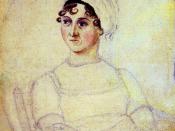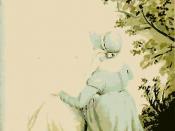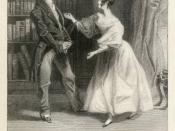Humour is an evident factor linking Emma and Pride and Prejudice. Austen's humour is subtle but often involves the harsh ridicule of her more comic characters that are satirised because of their absurd notions and behavior. Although this is often the case, there exists another type of humour in Austen's novels. This is provided with a much more gentle tone. For example, characters like Mr. Woodhouse in Emma, is never held up to ridicule harshly, like Lady de Burgh, who is, deservedly. The humour Austen uses, on many occasions, is to make moral judgments on those with social importance and meaning. Those characters, like Lady Catherine and Mrs. Elton, who think too well of themselves are held up for the reader to laugh at. Even Austen's central character, Emma, heads for a fall, which she deserving of after her 'evils of having rather too much her own way'.
From the beginning of Emma, we are introduced to Mr. Woodhouse, 'a valetudinarian' fearful and preoccupied with health, he is a man of little sense and intelligence.
Although he seems rather a selfish character, 'never able to suppose that other people could feel differently from himself' (chapter 1), it is not hurtful. If he were a cruel man, he would undoubtedly receive less sympathetic treatment; as he is not, Austen uses the character for gentle comedy and fun. One particularly comical event in the novel, is the plan for the journey home in the snow, from the Westerns'.
"This will prove a spirited beginning of your winter engagements...something new for your coachmen and horses to be making their way through a storm of snow." Poor Mr. Woodhouse was silent from consternation...Mrs. Weston and Emma tried earnestly to cheer him and turn his attention from his son-in-law, who was pursuing his triumph...



Writers often use humour to make moral judgments. Compare/ contrast in Emma and Pride and Prejudice
Ok, not spectacular, but I wouldn't say bad either
2 out of 3 people found this comment useful.